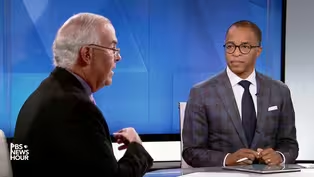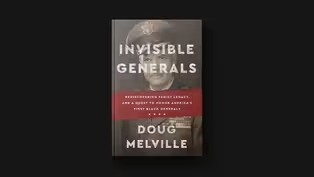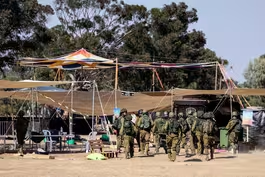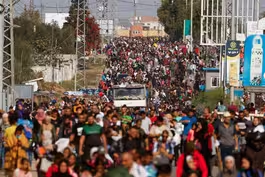
Israel-Hamas war takes deadly toll on journalists
Clip: 11/10/2023 | 6m 4sVideo has Closed Captions
Israel-Hamas war takes deadly toll on journalists covering the conflict
The Israel-Hamas war has led to the deadliest four weeks for journalists in over three decades. According to the Committee to Protect Journalists, dozens of journalists and media workers have been reported killed, injured, missing or arrested in the month since Oct. 7. Amna Nawaz speaks with CPJ president Jodie Ginsberg to understand what this means for those covering the war.
Problems playing video? | Closed Captioning Feedback
Problems playing video? | Closed Captioning Feedback
Major corporate funding for the PBS News Hour is provided by BDO, BNSF, Consumer Cellular, American Cruise Lines, and Raymond James. Funding for the PBS NewsHour Weekend is provided by...

Israel-Hamas war takes deadly toll on journalists
Clip: 11/10/2023 | 6m 4sVideo has Closed Captions
The Israel-Hamas war has led to the deadliest four weeks for journalists in over three decades. According to the Committee to Protect Journalists, dozens of journalists and media workers have been reported killed, injured, missing or arrested in the month since Oct. 7. Amna Nawaz speaks with CPJ president Jodie Ginsberg to understand what this means for those covering the war.
Problems playing video? | Closed Captioning Feedback
How to Watch PBS News Hour
PBS News Hour is available to stream on pbs.org and the free PBS App, available on iPhone, Apple TV, Android TV, Android smartphones, Amazon Fire TV, Amazon Fire Tablet, Roku, Samsung Smart TV, and Vizio.
Providing Support for PBS.org
Learn Moreabout PBS online sponsorshipGEOFF BENNETT: The Israel-Hamas war has led to the deadliest four weeks for journalists in over three decades.
Yesterday, Amna spoke with the head of the Committee to Protect Journalists to understand what this means for those covering the war and for a world trying to get a clear picture of the ongoing conflict.
AMNA NAWAZ: The war has taken a heavy toll, including on those documenting it.
Almost daily, there are reports of journalists and their families killed in the conflict.
This was the moment Al-Jazeera's Gaza bureau chief, Wael Al Dahdouh, a veteran journalist covering decades of conflict there, stopped reporting to mourn his own family, his wife, his son, daughter and grandson, all killed in an Israeli airstrike on October 25.
According to the Committee to Protect Journalists, or CPJ, this has been the deadliest war for journalists ever documented amid countless conflicts in the past few decades.
Jodie Ginsberg is the president of CPJ.
Jodie, welcome.
So, I want to put to you and share with our audience your numbers as of November 7, the total number of journalists and media workers killed so far since October 7, 34 Palestinian, four Israeli, one Lebanese, eight journalists reported injured, three reported missing, nine reported arrested.
Jodie, put these numbers and this war into context for us.
What does this say about journalist access and safety in the war?
JODIE GINSBERG, President, Committee to Protect Journalists: So, as you said, this is the deadliest conflict for journalists that we have ever documented, and we have been documenting attacks on journalists at the Committee to Protect Journalists for over 30 years.
For some context, last year, we documented the killings of 68 journalists and media workers worldwide over the space of 12 months.
And we have seen, as you said, 39 deaths in Israel, Gaza alone.
It's incredibly dangerous.
There are very few safe spaces in which journalists in Gaza can operate, and they're trying to report while themselves -- while they themselves are in danger.
AMNA NAWAZ: Jodie, I have to ask you about a recent allegation made by a pro-Israel advocacy group, claiming that The New York Times and Associated Press were working with freelance journalists they say are aligned with Hamas.
The New York Times and AP both deny that.
But we now have Israeli outlets too labeling some journalists as Hamas propagandists.
And we have to be clear, Hamas does run Gaza.
So, how can viewers make sure that what they're seeing is the full picture and not just what Hamas wants to get out?
JODIE GINSBERG: Well, there are a variety of media outlets operating in Gaza, and that's been the case for many years, journalists reporting for, as you say, Reuters, AP, AFP, international news outlets, as well as for local news outlets.
And what's really important is that we have that plurality of voices who can help us build a comprehensive picture of what's happening in Gaza.
There are no international news crews who are able to get into Gaza, to operate in Gaza.
So, we're absolutely reliant on those local Palestinian journalists to be our eyes and ears on the ground to tell us what's happening.
AMNA NAWAZ: Well, those disturbing numbers we cited earlier look like this on the ground.
I want to share with folks the moment that a Palestine TV correspondent, a man named Salman Al-Bashir, was reporting live outside a hospital.
He saw his own colleague being carried into the morgue.
This is that moment.
SALMAN AL-BASHIR, Correspondent, Palestine TV (through translator): Helmets, they're just emblems that we wear.
They don't keep us safe at all.
They do not keep us safe.
We're victims live on air.
We're just waiting our turn, one after the other.
Our colleague Mohammed Abu Hatab was here just 30 minutes ago.
He's been killed, along with his wife, his son, and his brother.
AMNA NAWAZ: Jodie, Mohammed Abu Hatab was one of those 39 journalists killed.
And I want to just put up this graphic as I ask you this question to show the names and the faces of those 39 journalists and ask you, as this war rolls on, as the death toll among journalists in particular more broadly mounts, what does that mean for our visibility into what is happening on the ground?
JODIE GINSBERG: Well, first, I want to say thank you to you, PBS, for humanizing those individuals.
It's very easy, I think, for the statistics to somewhat become numbing, become meaningless.
Besides every one of those statistics is a person with a family, with colleagues, and with friends.
And as this rolls on, what this increasing number of deaths means is that our ability to understand what's happening in Gaza and increasingly what's happening in the West Bank diminishes day by day.
We need journalists to be able to understand what's happening in Gaza, to understand what's happening in the West Bank to be those reporting on the conflict.
AMNA NAWAZ: And, Jodie, some Palestinians we have spoken to look at these numbers.
They look at the previous killing of journalists like Shireen Abu Akleh in 2022 before the war, a killing that the IDF took a year to come out and apologize for.
And they feel like journalists are not just being caught up in collateral damage, but they're being targeted.
What would you say to that?
JODIE GINSBERG: Well, what we do know is that there is a clear pattern of impunity.
In fact, in May of this year, the Committee to Protect Journalists published a report called "Deadly Pattern," which is a report on the killings of journalists by the Israeli military since 2001.
And what we found was that, between 2001 and September 2023, there were at least 20 journalists killings by the IDF.
The vast majority were Palestinians, and no one has ever been charged or held accountable for these deaths.
It's really important that, when a journalist is killed, those killings are investigated and those responsible are held accountable.
AMNA NAWAZ: That is Jodie Ginsberg, president of the Committee to Protect Journalists.
Jodie, thank you for joining us.
We appreciate it.
JODIE GINSBERG: Thank you.
GEOFF BENNETT: Today, CPJ reported that a 35th Palestinian journalist has been killed, bringing the death toll of journalists killed in the war to 40.
A Brief But Spectacular take on how to rebuild local news
Video has Closed Captions
Clip: 11/10/2023 | 3m 12s | A Brief But Spectacular take on how to rebuild local news (3m 12s)
Brooks and Capehart on takeaways from the 2023 elections
Video has Closed Captions
Clip: 11/10/2023 | 11m 28s | Brooks and Capehart on 2023 election takeaways and Manchin’s Senate shakeup (11m 28s)
High demand for new RSV drug for infants outpaces supply
Video has Closed Captions
Clip: 11/10/2023 | 5m 49s | High demand for new RSV treatment for infants outpaces national supply (5m 49s)
‘Invisible Generals’ tells story of 1st Black U.S. generals
Video has Closed Captions
Clip: 11/10/2023 | 7m 45s | ‘Invisible Generals’ chronicles little-known history of 1st Black U.S. generals (7m 45s)
Survivors, rescuers recount horrors of Hamas festival attack
Video has Closed Captions
Clip: 11/10/2023 | 8m 7s | Survivors, rescuers in Hamas music festival attack recount the day’s horrors (8m 7s)
Thousands flee Gaza hospitals as Israeli troops close in
Video has Closed Captions
Clip: 11/10/2023 | 4m 27s | Thousands of civilians flee northern Gaza hospitals as Israeli troops close in (4m 27s)
Providing Support for PBS.org
Learn Moreabout PBS online sponsorship
- News and Public Affairs

FRONTLINE is investigative journalism that questions, explains and changes our world.

- News and Public Affairs

Amanpour and Company features conversations with leaders and decision makers.












Support for PBS provided by:
Major corporate funding for the PBS News Hour is provided by BDO, BNSF, Consumer Cellular, American Cruise Lines, and Raymond James. Funding for the PBS NewsHour Weekend is provided by...





